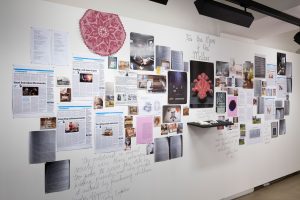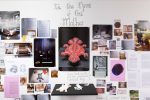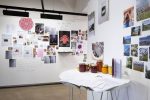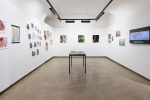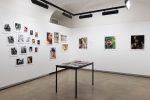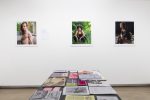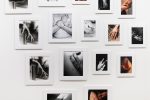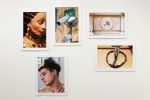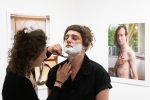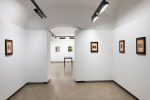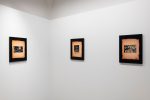CORPOREALITY REPAIR CONCILIATION. Investigating Ways Into a Better Coexistence
Rosalyn D’Mello, Suzana Milevska, Sam Richardson, Olga Ştefan
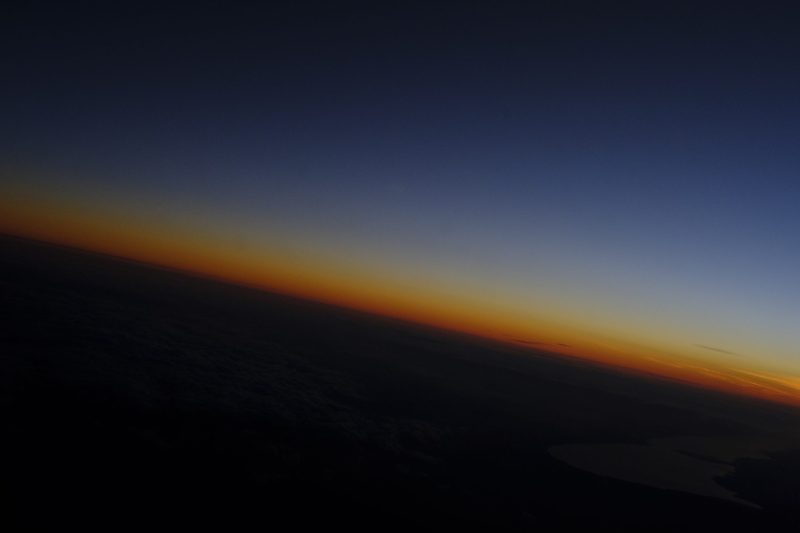
Rosalyn D’Mello with contributions by Anna Hagen, Marlene Hausegger, Maridl Oberhofer, Monika Oberhofer, Rita Oberhofer, Suguna Sridhar
Suzana Milevska in collaboration with Tal Adler, Seraphine Appel, Sasha Huber, Ingrid Manka, Merete Røstad, Simona Schneider, a. o.
Olga Ştefan with a contribution by Aurel Mărculescu
An exhibition of the Büchsenhausen Fellowship Program for Art and Theory 2021–22.
curated by Andrei Siclodi
The exhibition Corporeality, Repair, Conciliation: Investigating Ways Into a Better Coexistence addresses the urgent need to reconceptualize our social as well as socio-political relations with one another. Driven by apparently unstoppable capitalism, the erosion of these relations has long been concealed under the guise of virtual prosperity. However, in the light of the current geopolitical shifts set in motion by war and the resulting threatening and already occurring disruptions, the last doubts about the malign character of this erosion must be questioned. Therefore, wouldn’t it be now the very moment to reflect on practices, procedures, and ideas that aim at or already demonstrate sustainable forms of coexistence? This exhibition offers a perspective on the possibilities available. It brings together works and research materials the participants in the Fellowship Program for Art and Theory 2021-22, Rosalyn D‘Mello, Suzana Milevska, Sam Richardson and Olga Stefan, have produced or collected in Büchsenhausen over the past few months and which, on a common meta-level, deal in different ways with feminist-queer perspectives and proceedings, corporeality and identity, necessary remembrance
and the accompanying rewriting of art history, as well as with questions of conflict and coming to terms with the past.
OPENING
Donnerstag | Thursday 12. 05. 2022, 19.00
EXHIBITION DATES
13. 05. – 16. 07. 2022
Büchsenhausen Fellows 2021-22:
Rosalyn D’Mello (she/her) grew up as a “Bombay Goan” in Mumbai. She graduated in English Literature from St. Xavier’s College, Mumbai, and earned her Master’s degree from the Centre of English Studies, Jawaharlal Nehru University, Delhi. After a brief stint as a theatre critic in Mumbai, in 2010, she adopted Delhi as her base for almost ten years before moving to her current location in Tramin, an alpine town in the autonomous province of South Tyrol in Italy. Over her decade-long career as a freelancer, she has performed various callings as a feminist writer, art critic, columnist, essayist, editor, researcher, consultant, and proofreader across industries.
She is currently a TBA21 Ocean Fellowship 2021 Mentor. She is the author of the critically acclaimed memoir, A Handbook for my Lover. She is also the recipient of the India Foundation for the Arts arts research grant (2019-2020), which is supporting her ongoing research for her forthcoming book for Oxford University Press, India, based on her visits to Indian artists’ studios. Since January 2016, she has been writing a weekly memoir-based, feminist column for mid-day. She writes fortnightly art columns for STIR while her criticism frequently appears in the Indian weekly magazine Open. Her writing has appeared in numerous literary anthologies, such as Dress (HarperCollins India, 2018), Walking towards Ourselves: Indian Women Tell their Stories (HarperCollins India, 2016; Hardie Grant Australia, 2016) and collections of art criticism, including Critical Writing Ensembles: Dhaka Art Summit 2016 (Office for Contemporary Art, Norway; Mousse Publishing, 2016) and Navigating the Planetary (Verlag für moderne Kunst, 2020). She was previously the editor of BLOUINARTINFO India (2012-2014) and was nominated for the Forbes’ Best Emerging Art Writer Award in 2014. She was also shortlisted for the Prudential Eye Art Award for Best Writing on Asian Contemporary Art in 2014. She was an evaluator for The Andy Warhol Foundation Art Writers Grant in 2020.
https://www.rosalyndmello.com/
Suzana Milevska is a curator and theorist of art and visual culture, based in Skopje, North Macedonia. Her theoretical research projects employ postcolonial and feminist institutional critique of representational regimes of hegemonic power in arts and visual culture, and the deconstruction and decolonization of contentious cultural heritages in art institutions, collections, and public spaces. Her curatorial projects focus on collaborative and participatory art practices, feminist projects by women artists looking at visual microhistories in historic and family photographic archives, and community-based projects in solidarity with marginalized and disenfranchised communities.
In 2019, Milevska curated the exhibition Contentious Objects/Ashamed Subjects at the Polytechnic University Milan as Principal Investigator of TRACES – Transmitting of Contentious Cultural Heritages with the Arts – From Intervention to Co-production (EU Programme Horizon 2020, 2016-2019). From 2013 to 2015, she was Endowed Professor of Central and South Eastern European Art Histories, Academy of Fine Arts Vienna. Milevska was a Fulbright Senior Research Scholar (Library of Congress, Washington D.C.). She holds a PhD in Visual Cultures from Goldsmiths College London. In 2012, she won the ALICE Award for Political Curating, and the Igor Zabel Award for Culture and Theory. Her research and curatorial project The Renaming Machine (2008-2011, Ljubljana, Skopje, Pristina, Zagreb, Vienna) addressed the politics and aesthetics of renaming, rewriting histories, and the overwriting of memory in art and public space in South and Eastern Europe. In 2010, Milevska initiated the project Call the Witness that focused on contemporary Roma artists and consisted of a participatory online Roma Media Archive, the exhibition Call the Witness, (BAK Utrecht), and the Roma Pavilion at 54 Venice Biennial (Palazzo Zorzi, Venice). In 2011, she also curated the project Roma Protocol, Wiener Festwochen, Austrian Parliament, Vienna.
Milevska’s publications include Gender Difference in the Balkans (VDM Verlag, 2010) and the readers The Renaming Machine: The Book (P.A.R.A.SI.T.E. Institute, 2010), On Productive Shame, Reconciliation, and Agency (SternbergPress, 2016), and Inside Out – Critical Discourses concerning Institutions (co-edited with Alenka Gregorič, 2016).
Sam Richardson is an interdisciplinary artist working primarily in photography, as well as video, sound and writing. They are based in Los Angeles, CA. As an image-maker working in a documentary-informed practice, Richardson strives to unlearn, break open and find new ways of creating images that interrogate collaboration and photographic relationships in the context of the body, trauma and care. She utilizes her experience as a Crisis Counselor to survivors in New York and Los Angeles, abolitionism and personal history to enter their work with a practice of care and investigation into personal and shared experience.
They graduated from the Photography Department at the UCLA MFA program in 2020 where she TA-ed and supported professors in several art studio courses in the Art Department, as well as TA-ed in the Arts Education Department. They are dedicated to creating the most expansive and inclusive form of arts education from theory to practice. During winter 2020-21 she was Artist and Instructor in Residence at Urbano Project in Boston. Currently, they are the Director of Communications and a Teaching Artist at Creative Acts. In Fall 2021 they teach a Foundations course at California Institute for the Arts and a photography course with Las Fotos Project.
http://samxrichardson.com
Olga Ştefan is a curator, arts writer, documentary filmmaker and researcher, born in Bucharest, raised in Chicago, and currently residing in Zurich. Her work mostly deals with the politics of memory, migration and identity. Ştefan has curated more than thirty international exhibitions in museums, art centers, and galleries and has contributed to magazines such as Art in America, FlashArt, Art Review, Sculpture Magazine and many others. She is the founder of The Future of Memory, the transnational platform for Holocaust remembrance in Romania and Moldova through art and media, where her documentary films can be viewed. Her chapter on the Vapniarka concentration camp appeared in the volume Memories of Terror, 2020, CEEOL Press, Frankfurt.
http://www.olgaistefan.wordpress.com
http://www.thefutureofmemory.ro
